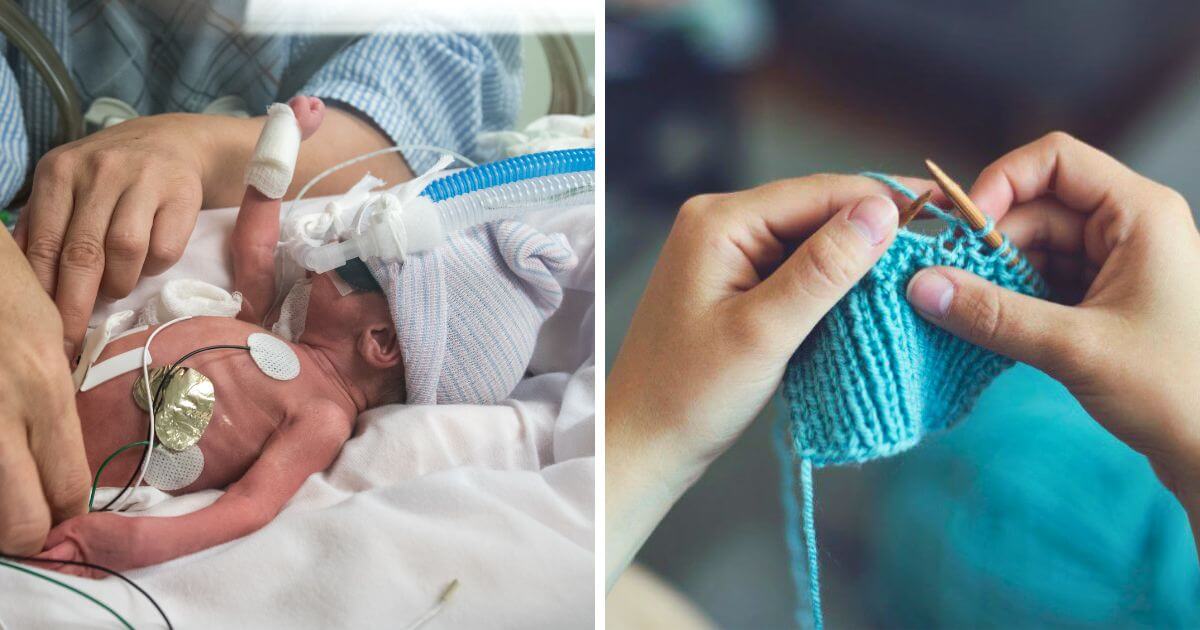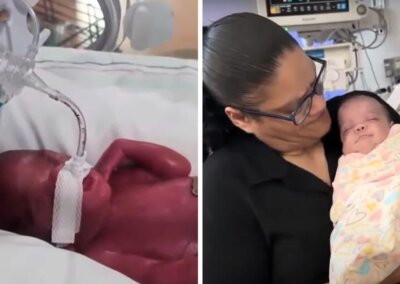A woman has made over 150 tiny hats for extremely premature babies in memory of her son.
Judy Alder makes tiny hats for premature babies in neonatal intensive care units (NICU) to honour her son’s memory and care for hundreds of babies.
“I didn’t get to be a grandma, so I’m making hats for them”, she explained. Judy tragically lost her son to Alpha-1 antitrypsin deficiency, a rare genetic condition that can cause severe lung and liver damage.
“I miss him, but he wants me to be happy”, she said, adding that making the tiny hats is a source of happiness for her.
Judy lives in a senior community, and a few years ago one of the employees there gave birth to premature twin girls. At the time, the hospital did not have enough hats for the newborns, so Judy decided to help.
Judy has since made over 150 hats, knitting at least 67 in a year. She delivers them at Christmas to a local hospital that specifically cares for sick and premature babies born at the edge of viability to full-term infants who need extra support.
Babies born prematurely struggle to maintain their body warmth
According to Anna Wroble, the hospital’s paediatric NICU manager, premature babies need these tiny beanies to help regulate their body temperatures.
“All babies are born with this extra layer of what’s called brown fat, whose number one job is to create heat in a baby and help maintain body warmth”, Wroble said. “Premature babies, when they’re born a little bit early, that brown layer of fat was missed because it’s developed in the last month of pregnancy”.
She said that this is the reason it’s difficult to keep premmies warm. They are unable to wear normal clothing so heating lamps, incubators and hats are necessary.
“Everything is immature: their liver, their stomachs, their brains, everything”, Wroble said. “It allows nurses to be able to see when they’re struggling by the way they’re pulling and breathing. To see the skin colour changes because babies can’t say, ‘I don’t feel well, or this hurts’”.
One of the key indicators of an infant’s stability that nurses monitor is their temperature, she said. Cold can stress babies, dropping their blood sugar levels and eventually becoming fatal.
“The beanies aren’t just a fun and compassionate and wonderful thing for our families. It’s also clinically necessary”, said Wroble.
Hygiene is essential in a hospital environment, especially around premature babies, requiring staff to wash the hats daily. For this reason, the NICU needs more hats than it has babies.
Wroble described NICU parents’ gratitude for Judy’s work in worrying and uncertain times.
“When they come to the NICU and have an itty bitty little baby that you can’t handle frequently, they start to feel a little bit out of control”, she said. “But that gives the family back some control. Make some choices. Choose a cute hat for your baby”.
Judy has been knitting so many hats, she keeps running out of yarn
Another inspiration for Judy’s hat-making mission is her 12-year-old twin great nieces, who weighed only 4lbs and 5lbs, respectively, at birth. Back then, she didn’t know how to make hats for them.
“I wish I knew how to make them”, she said. “When my niece had them, I told her I wanted to be called aunt-grandma. I love them all”.
Judy has been knitting so much that she ran out of yarn after making lots of pink hats for girls. The hospital then requested a batch of blue hats for boys, so she doesn’t plan on stopping knitting anytime soon.
“As long as my hands will let me”, she laughed. “I just think the babies would be so beautiful in them”.
Warm hats provide support and comfort for parents and their premature babies whose prospects have improved markedly in recent years.
In the decade to 2019 alone, the survival rate for extremely premature babies born at 23 weeks doubled, prompting new guidance from the British Association of Perinatal Medicine (BAPM) that enables doctors to intervene to save premature babies from 22 weeks gestation. The previous clinical guidance, drafted in 2008, set the standard that babies who were born before 23 weeks gestation should not be resuscitated.
Spokesperson for Right To Life UK, Catherine Robinson, said “Judy Alder’s initiative honours her son’s memory and supports vulnerable members of society. This act of love and care reminds us all of the profound impact one person can have on countless tiny lives”.












